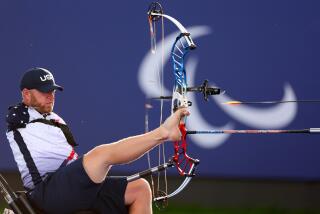Ross-Duggan Determined Not to Stray Off Course
- Share via
Sailing has been a big part of Dr. John Ross-Duggan’s life since he was 7.
By the time he was a teenager, he was doing well in California regattas, and at 15 he was seventh in the 1970 Hobie Nationals in Honolulu. After three years at Newport Harbor High, he entered premed studies at UC Irvine, where he also sailed for the university team.
But an automobile accident in 1978, after he had completed his third year of medical school, left him a quadriplegic.
Ross-Duggan says he made up his mind then that his life wouldn’t be anymore limited than necessary. Six months later, after rehabilitation, he returned to medical school. Then, only about 18 months after the accident, he was back in a sailboat.
Beginning Sunday, Ross-Duggan, 40, will compete in the Atlanta Paralympic Games as skipper of the U.S. entry in yachting against an international field of 14 boats. Competition runs five days at Lake Lanier, northeast of Atlanta.
“It’s something I’m very much looking forward to,” he said. “And we’re optimistic that we can win the gold medal, although it’s a cautious optimism.”
Ross-Duggan, a radiologist in Orlando, Fla., has earned a reputation as one of the nation’s top disabled sailors. He has won the last two North American Challenge Cups on Lake Michigan in Freedom-20 yachts.
“The good thing about the Paralympics is that everyone can compete on a level playing field,” he said. “Since the boats are virtually the same, it really comes down to which crew sails the best. I’ve gone out of my way to practice against able-bodied sailors in the last several months.”
The Paralympic boats are all 23-foot Sonars, with open cockpits. Competition will be in fleet-race format.
Ross-Duggan’s boat was third in a pre-Paralymic Regatta in April in St. Petersburg, Fla., finishing behind entries from England and Canada, but it was close. “We were only three points behind the British and one point behind the Canadians,” Ross-Duggan said.
Ross-Duggan’s crew includes two other disabled sailors, both from Maryland. Each crew also includes one able-bodied participant who helps coordinate and handles lifting.
“I was paralyzed from the lower cervical area down, and it has limited me being able to get around, but I still have 30% to 40% use of my upper body, and it allows me to be independent in a molded environment,” Ross-Duggan said.
“But I was determined that it wouldn’t force me to miss out on the things that life had to offer me. I was able to push myself and hardly miss a stride in getting back into medical school.”
Ross-Duggan went to the UC Irvine Medical Center for his four-year residency, then to Parkland Hospital in Dallas with a fellowship in neuroradiology before settling in Orlando.
“It took me about a year and half after the accident to get back into a boat, but once I was aware I could do it, it was a great feeling to be back at it,” he said. “When I’m sailing, I have no feeling of disability.”
(BEGIN TEXT OF INFOBOX / INFOGRAPHIC)
Paralympic Games
The 1996 Paralympic Games for disabled athletes will be Aug. 15-25 in Atlanta.
The Paralympics, which began in 1960, are every four years at the Olympic venues several weeks after the summer and winter games.
The 1996 games, which feature competition in 17 sports, are expected to attract more than 4,000 athletes from 120 countries.
The Paralympics bring together competitors from six international organizations, including those representing blind athletes and the wheelchair-bound.
Paralympic organizers strive to make the games as close as possible to the Olympics. Events will be in the same venues, and the rules of competition remain the same except where they must change to accommodate a disability. For instance, in wheelchair tennis, players are allowed two bounces.
President Clinton is expected to attend the opening ceremonies. Actor/director Christopher Reeve, who was paralyzed after a riding accident, will be master of ceremonies.
The 1996 games will be the first full-fledged Paralympics to be held in the United States. Disarray in various organizations representing athletes resulted in the Paralympic events being split between England and Long Island, N.Y., in 1984, when Los Angeles hosted the Olympic Games.
The Paralympics are not to be confused with the Special Olympics, which stages sporting events for the mentally disabled. This year, for the first time, athletes with mental disabilities will be allowed to compete on a limited basis, fulfilling a decision made three years ago by the International Paralympic Committee. Mentally disabled athletes will be allowed to compete against each other in four swimming and four track and field events.
One of the top Paralympic athletes of all-time is Trischa Zorn, 32, a visually impaired swimmer who grew up in Mission Viejo. Zorn missed making the 1992 U.S. Olympic team by .01 seconds. She won 10 gold medals and two silver at the Paralympic games in Barcelona that year. Zorn, who teaches disabled kids at a school in Indianapolis, plans to participate in Atlanta.
Other previous Paralympic athletes have included Arnie Boldt, a single-leg amputee who high jumped 6-8 1/2, and Tony Volpentest, a double-leg and double-arm amputee who, using protheses, ran 100 meters in 11.6 seconds.
More to Read
Go beyond the scoreboard
Get the latest on L.A.'s teams in the daily Sports Report newsletter.
You may occasionally receive promotional content from the Los Angeles Times.






